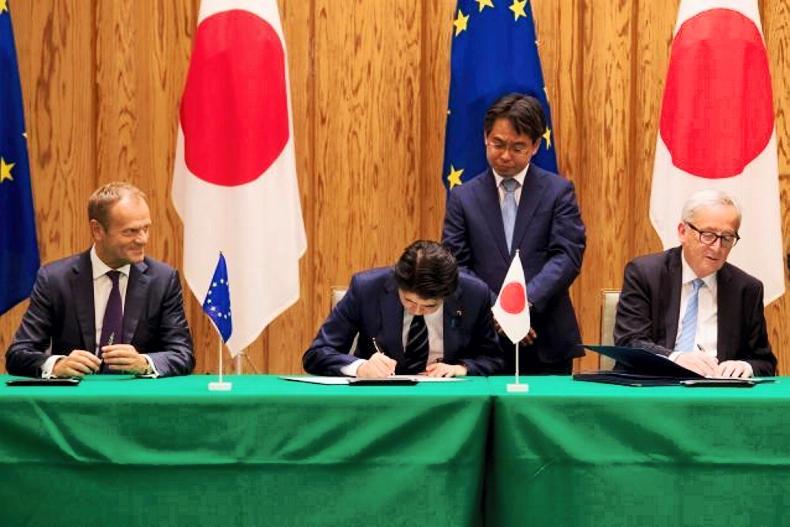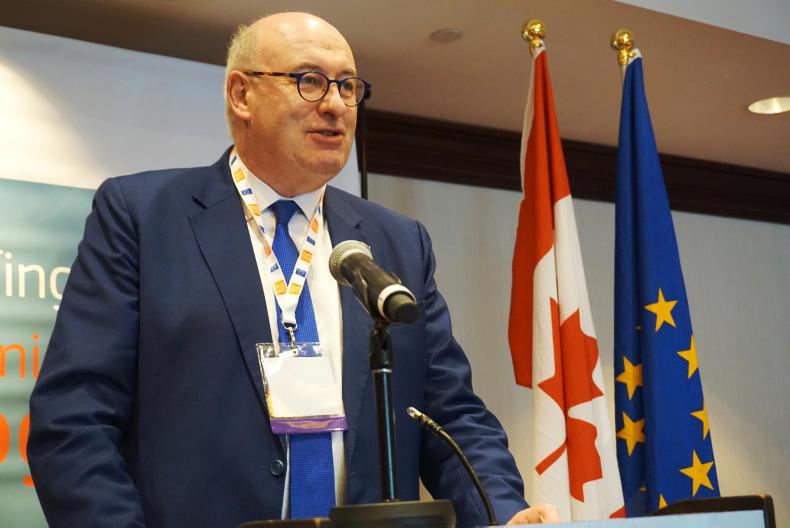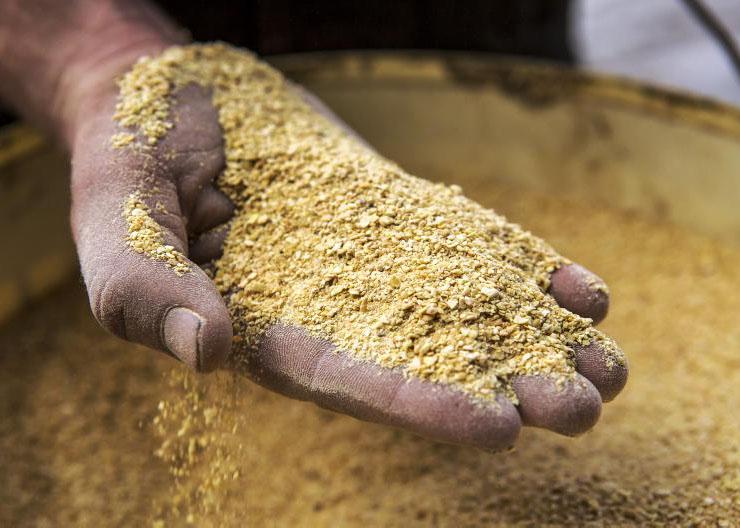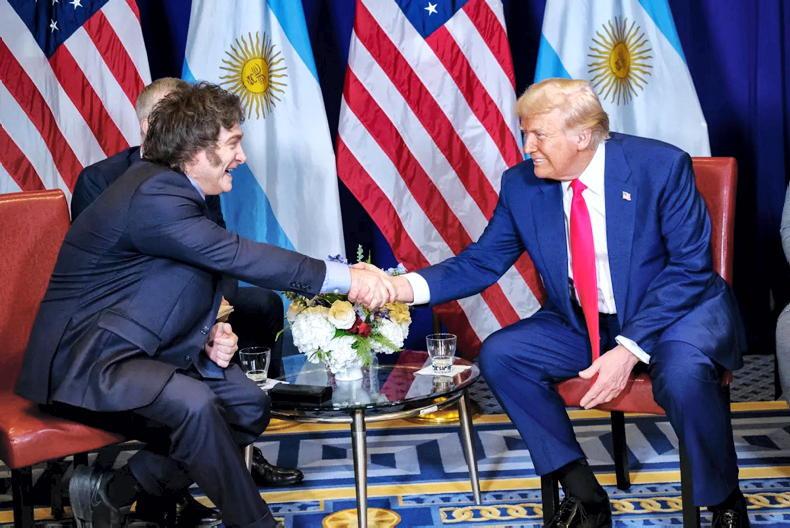Now that the option of a huge tariff-free quota for UK beef imports is the direction of travel in a no-deal Brexit, which of the major beef-exporting nations in the world is likely to target the UK?
Brazil was the world’s biggest beef exporter in 2018, shipping a total of 2.1m tonnes carcase weight equivalent (CWE), a quarter of their production of 8m tonnes.
China and Hong Kong are their main export markets, taking 620,000t CWE in 2017, and this increased further in 2018.
The Middle East and North Africa are also major markets as is Russia, with the EU receiving 128,000t of Brazilian beef in the period January to November 2018.
Current price in Brazil is the equivalent of €2.16/kg for a steer similar to an R3 in the EU. UK would be very attractive to Brazil and it has already a well-established presence in the EU market.
India was the second-largest bovine meat exporter in 2018, exporting 1.7m tonnes CWE, but is not considered a major player in the global trade outside of Asia.
For religious reasons, India isn’t a significant beef consumer but buffalos are still widely used for land cultivation in the way horses were in the western world prior to the development of tractors.
Therefore, Indian bovine production is buffalo-based and product is sold in the lower-value Asian markets.
Australia exported 1.6m tonnes of beef in 2018, with the USA being its main destination for forequarter manufacturing beef, while China, Japan and South Korea are its main markets in Asia.
With a current price the equivalent of €3.15/kg for an animal similar to the R3 steer, the EU hasn’t been a significant market to date.
Australia also has a free trade agreement with Japan and China and therefore these are likely to remain its priority markets for the foreseeable future.
The US is unique in the global beef trade in that it is one of the world’s top for exporters of beef while at the same time being the world’s biggest beef importer in 2018.
The US imported 1.4m tonnes, more or less the same as it exported. This is because of the need to achieve carcase balance – the US consumes more manufacturing burger-type meat and is therefore a huge exporter of steak and hind quarter meat to Asian markets, particularly Japan and South Korea and Mexico, while importing manufacturing beef, with Australia the biggest supplier.
With a current price the equivalent of €3.88/kg, 20c/kg better than Ireland and a debate about hormones and use of acid in carcase washing, it is unlikely that the US will target the UK meat market in the immediate future.

The EU and Japan signed a free trade agreement in July 2018 and it came into effect at the start of this month.
The next tier of major beef exporters, shipping between 500,000t and 600,000t annually are New Zealand (NZ), Ireland, Argentina, Canada and Uruguay.
Of these, NZ is already well established in Asia with free trade deals in Japan and China. With a beef price in excess of €3/kg, it is unlikely that the UK will become a major market in the immediate future.
Canada
Canada already has a free trade agreement with the EU and made little use of it as it struggles to attract farmers willing to commit to producing hormone-free beef, so is unlikely to be interested in the UK either.
Argentina
Argentina, on the other hand, has increased its exports fourfold since 2015 when there was a change of Government and a removal of the tax on beef exports.
It is expected to grow its exports further to 650,000t in 2019 and with a beef price of around €2.20/kg and a foothold of 70,000t in the EU market in 2018, we can expect Argentina to become a key supplier to the UK if there is a tariff free quota post Brexit. Uruguay is also an exporter to the EU and though its beef price is ahead of the other South American countries, we can expect them to be a player.
Navigating global trade conference 15th March
The IFJ announced this week in partnership with Grant Thornton and as part of an EU Citizens dialogue, a Navigating global trade Conference to be held in the RDS and themed beyond Brexit. It will address these issues and explore what the prospects are for trade in Irish agri produce after Brexit. Taking part will be the New Zealand Ambassador to the EU who will explain further New Zealand’s place in global trade and their ambitions post Brexit.
Navigating global trade conference 15 March
The Irish Farmers Journal announced this week in partnership with Grant Thornton and as part of an EU Citizens dialogue, a "Navigating Global Trade" conference to be held in the RDS and themed "Beyond Brexit".
It will address these issues and explore what the prospects are for trade in Irish agri produce after Brexit. Taking part will be the New Zealand Ambassador to the EU who will explain further New Zealand’s place in global trade and their ambitions post-Brexit.
Click here to register for the Navigating Global Trade conference.
(Statistics – USDA FAO)
Now that the option of a huge tariff-free quota for UK beef imports is the direction of travel in a no-deal Brexit, which of the major beef-exporting nations in the world is likely to target the UK?
Brazil was the world’s biggest beef exporter in 2018, shipping a total of 2.1m tonnes carcase weight equivalent (CWE), a quarter of their production of 8m tonnes.
China and Hong Kong are their main export markets, taking 620,000t CWE in 2017, and this increased further in 2018.
The Middle East and North Africa are also major markets as is Russia, with the EU receiving 128,000t of Brazilian beef in the period January to November 2018.
Current price in Brazil is the equivalent of €2.16/kg for a steer similar to an R3 in the EU. UK would be very attractive to Brazil and it has already a well-established presence in the EU market.
India was the second-largest bovine meat exporter in 2018, exporting 1.7m tonnes CWE, but is not considered a major player in the global trade outside of Asia.
For religious reasons, India isn’t a significant beef consumer but buffalos are still widely used for land cultivation in the way horses were in the western world prior to the development of tractors.
Therefore, Indian bovine production is buffalo-based and product is sold in the lower-value Asian markets.
Australia exported 1.6m tonnes of beef in 2018, with the USA being its main destination for forequarter manufacturing beef, while China, Japan and South Korea are its main markets in Asia.
With a current price the equivalent of €3.15/kg for an animal similar to the R3 steer, the EU hasn’t been a significant market to date.
Australia also has a free trade agreement with Japan and China and therefore these are likely to remain its priority markets for the foreseeable future.
The US is unique in the global beef trade in that it is one of the world’s top for exporters of beef while at the same time being the world’s biggest beef importer in 2018.
The US imported 1.4m tonnes, more or less the same as it exported. This is because of the need to achieve carcase balance – the US consumes more manufacturing burger-type meat and is therefore a huge exporter of steak and hind quarter meat to Asian markets, particularly Japan and South Korea and Mexico, while importing manufacturing beef, with Australia the biggest supplier.
With a current price the equivalent of €3.88/kg, 20c/kg better than Ireland and a debate about hormones and use of acid in carcase washing, it is unlikely that the US will target the UK meat market in the immediate future.

The EU and Japan signed a free trade agreement in July 2018 and it came into effect at the start of this month.
The next tier of major beef exporters, shipping between 500,000t and 600,000t annually are New Zealand (NZ), Ireland, Argentina, Canada and Uruguay.
Of these, NZ is already well established in Asia with free trade deals in Japan and China. With a beef price in excess of €3/kg, it is unlikely that the UK will become a major market in the immediate future.
Canada
Canada already has a free trade agreement with the EU and made little use of it as it struggles to attract farmers willing to commit to producing hormone-free beef, so is unlikely to be interested in the UK either.
Argentina
Argentina, on the other hand, has increased its exports fourfold since 2015 when there was a change of Government and a removal of the tax on beef exports.
It is expected to grow its exports further to 650,000t in 2019 and with a beef price of around €2.20/kg and a foothold of 70,000t in the EU market in 2018, we can expect Argentina to become a key supplier to the UK if there is a tariff free quota post Brexit. Uruguay is also an exporter to the EU and though its beef price is ahead of the other South American countries, we can expect them to be a player.
Navigating global trade conference 15th March
The IFJ announced this week in partnership with Grant Thornton and as part of an EU Citizens dialogue, a Navigating global trade Conference to be held in the RDS and themed beyond Brexit. It will address these issues and explore what the prospects are for trade in Irish agri produce after Brexit. Taking part will be the New Zealand Ambassador to the EU who will explain further New Zealand’s place in global trade and their ambitions post Brexit.
Navigating global trade conference 15 March
The Irish Farmers Journal announced this week in partnership with Grant Thornton and as part of an EU Citizens dialogue, a "Navigating Global Trade" conference to be held in the RDS and themed "Beyond Brexit".
It will address these issues and explore what the prospects are for trade in Irish agri produce after Brexit. Taking part will be the New Zealand Ambassador to the EU who will explain further New Zealand’s place in global trade and their ambitions post-Brexit.
Click here to register for the Navigating Global Trade conference.
(Statistics – USDA FAO)










SHARING OPTIONS